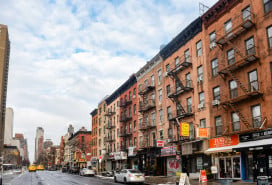Is that dream garden/beach house on your roof? Here's how to get your hands on raw roof space - and what it's worth

Summer's almost here, and if you’re like us, your mind’s already started wandering toward that beach house you've always fantasized about but can't quite afford.
But what if that “beach house” is just upstairs?
Yes, it’s true, NYC co-ops and condos have been known to sell raw roof space to owners so that they can create patios, gardens, and extensions to their own apartments.
“I tend to see this issue come about in co-ops more than condos,” says Jonathan Miller of Miller Samuel Appraisers and Consultants. “I think the reason for it is many co-ops were either converted from rentals or were built a long time ago when not much attention was paid to roof space. On the other hand, in condos, developers would probably have taken advantage of any raw space already.”
So how much will it take to get a board to hand you the exclusive rights to some undeveloped roof space?
The price of paradise
“A prudent board, if it was selling roof space and had the right to do so, would consult a broker to determine the value of square footage...there’s a market for this just like anything else,” says Scott Greenspun of law firm Braverman & Associates.
Boards also consult appraisers like Miller, who says the value of rights to raw roof space are based on the ultimate use of the space once improvements are made. Generally, if a co-op or condo owner is planning on using the space to build a permanent structure, it’s more expensive.
“Like a storage area, raw roof spaces are not put out to the public. So, it’s a value we cull in terms of a specific use, as opposed to just what the market will bear,” he says.
“There’s not a pricepoint like, 'On the UES, raw roof space is $X per square foot.' It really depends on the building. The value of the outdoor space is proportional to the interior space in the apartment adjacent to it. Basically, we develop a ratio between the apartment adjacent and the outdoor space, which takes into account things like view and light already.”
Miller says that the value will usually fall somewhere between 10 and 30 percent of the per-square-foot value of the interior space.
Doing the deal
When it comes to buying space in a co-op, it’s up to the board to decide whether or not they want to sell the space, which belongs to the corporation. They also decide how many shares to allocate for the space.
Miller says his company will send a “letter of adequacy and reasonable relationship,” to the board that details "our logic on the value of the space and the appropriate share allocation."
In the case of a co-op, maintenance fees will increase because the newly configured apartment will have more shares allocated to it (which allows the building to collect money in perpetuity).
In a condo, on the other hand, “The roof is usually deemed a common element, meaning that everyone who owns a unit has an undivided ownership interest in the roof, such that you need to get permission from all the unit owners to sell roof space,” says Greenspun. But he adds, “the governing documents of most condominiums give the board of directors the right to lease and/or license roof space."
Often times the condo will “lease” the space rather than sell it, meaning that they can get payments in perpetuity as well.
The money that the co-op corporation or condo board get from these sales generally goes into a general operating account or reserve fund, though in the case of a condo, it could technically go to all the owners, says Greenspun.
Political hurdles
But even if there is raw roof space available in a building, co-op and condo boards may be reluctant to sell, lease or license such space because “the board would subject itself to criticism from other owners who will also want access to such amenity, or the board may be concerned about the structure of the roof, and the effect any construction would have on it,” says Greenspun.
“It may open up a can of worms. Use of the roof can be a sensitive issue, because everyone would like to have outdoor space in the city,” Greenspun says. "Giving selected owners access to the roof can be a sensitive issue, because everyone would like to have outdoor space in the city. If other unit owners or shareholders feel it’s unfair, it may not be worth the money to the building/shareholders.”
Granting exclusive use to outdoor space is most realistic when the unit owner or shareholder has an apartment adjacent to, or has access to, space that would not reasonably be used by other residents, explains Greenspun.
“But it’s going to depend on the configuration of the building, how many residents it has, the condition of the roof, how to get access -- there are so many factors the board would have to consider before embarking on this type of transaction," he says.
Related posts:
Outdoor space roundup: How to tell if your balcony is going to fall off, and more
The Board Room: How to sell a hallway (sponsored)
How much is a higher floor worth?
The true value of an on-site storage unit
Will converting my half-bath into a laundry room hurt my resale value?
I can't use my 43rd floor terrace--but the closets are amazing


























